 Petzlover
Petzlover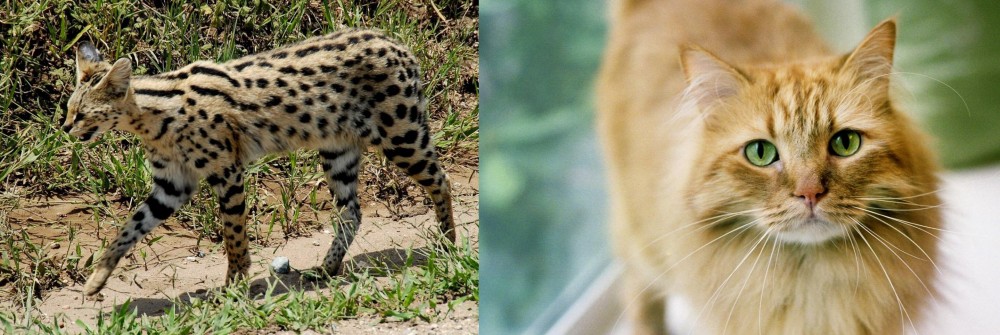 African Serval is originated from South Africa but Ginger Tabby is originated from United States. African Serval may weigh 12 kg / 27 pounds more than Ginger Tabby. Both African Serval and Ginger Tabby has same life span. Both African Serval and Ginger Tabby has same litter size. African Serval requires Low Maintenance. But Ginger Tabby requires Moderate Maintenance
African Serval is originated from South Africa but Ginger Tabby is originated from United States. African Serval may weigh 12 kg / 27 pounds more than Ginger Tabby. Both African Serval and Ginger Tabby has same life span. Both African Serval and Ginger Tabby has same litter size. African Serval requires Low Maintenance. But Ginger Tabby requires Moderate Maintenance
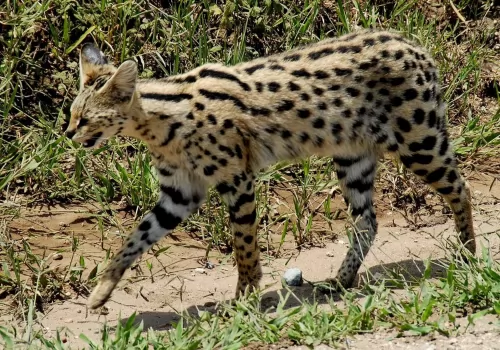 The African Serval is a wild cat that hails from Africa. You’ll see them on Africa’s savannas where there is tall grass and reeds, preferably near water.
The African Serval is a wild cat that hails from Africa. You’ll see them on Africa’s savannas where there is tall grass and reeds, preferably near water.
If you want to own a serval cat, you have to check whether you require licenses and permits as they are particularly difficult to rehome once you have owned one. Humans have kept them since ancient times, but they are not domesticated cats as such.
Breeding servals arrived in the United States many decades ago. Breeders have also crossed serval cats with domestic cats to produce hybrids, one of which is the Savannah cat.
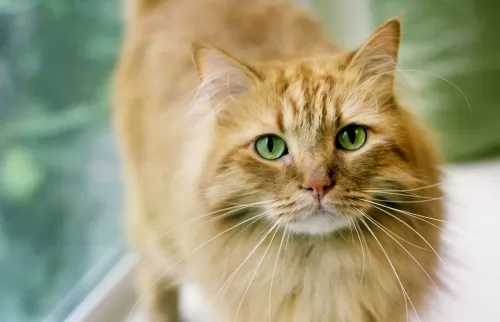 All ginger cats are tabbies – they have spots and stripes on their coat. The tabby pattern is a common wild type, and it is believed that medieval cats were tabbies.
All ginger cats are tabbies – they have spots and stripes on their coat. The tabby pattern is a common wild type, and it is believed that medieval cats were tabbies.
Most paintings and medieval manuscripts show them to be tabbies. Many people believe that these ginger cats come from a particular breed but this isn’t the case.
Ginger Cat Appreciation Day takes place in September. These cats, known as Orange Tabby Cats are very popular and they can actually have a yellow-, orange or red fur.
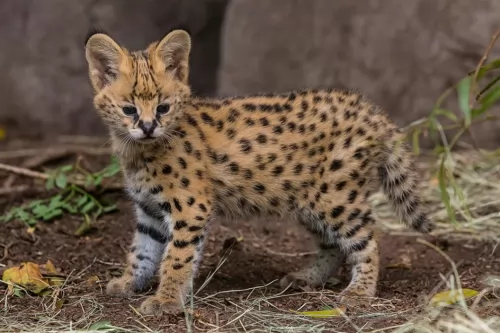 The Serval is a medium to large-sized cat that stands at between 54–62 cm in height and weighs in the region of 9–18 kg.
The Serval is a medium to large-sized cat that stands at between 54–62 cm in height and weighs in the region of 9–18 kg.
Some people think its a cat that looks similar to a Cheetah and this is because it also has a small head. It is known for its large ears which are black at the back with a large white dot. The attractively patterned coat is both spotted and striped with black against a golden/tawny shade.
These wild cats make a number of different noises - high pitched cries to growls, spitting sounds and purring. Another well-known feature with the cat is its particularly long legs. The tail has some black rings and it is black-tipped. The eyes of the Serval are a brown/greeny color.
The Serval cats will only come together for mating and then they resume their solitary lives. Gestation lasts for roughly 73 days after which up to 6 kittens can be born. In captivity, a Serval can live to be about 20 years of age.
The Serval is an active cat night and day. They are solitary animals not known for strong social interactions with humans but they can be playful with the few humans he gets to know.
People need to always know that owning a wild pet like this comes with risks. Not only that, a Serval wants to mark its territory and while you may provide a litter box, it's not to say he will use it.
They are able to bond with humans to some extent, more so if they were hand-fed from early on. They bond with one person and can form an affectionate relationship with that one person.
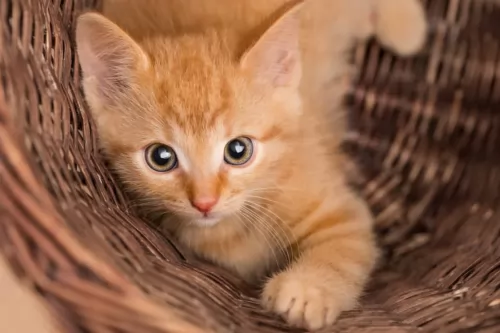 Ginger cats have different patterns to the short or long silky coats – mackerel or striped, spotted, patched, ticked, and classic.
Ginger cats have different patterns to the short or long silky coats – mackerel or striped, spotted, patched, ticked, and classic.
In fact the Ginger Tabby isn’t referring to a specific cat breed but rather a distinct color pattern. These cats get their ginger coloring from the pigment pheomelamin, the pigment red-headed humans also have.
The Ginger Tabby can range in size so generally they’re between 3 -6kg in weight. It also seems that a higher number of ginger or orange tabbies are male, put down to genetics. The eyes of the cat can be green, gold or copper.
The Ginger Tabby just loves being around his human family and to show his pleasure, you’ll hear loud purring.
They are affectionate cats and aren’t afraid to show you. These cats have a reputation for being friendly but you also have to bear in mind that a cat’s personality depends on their early socialization with people and other cats.
The Ginger Tabby is an independent, bold, courageous cat with a feisty nature.
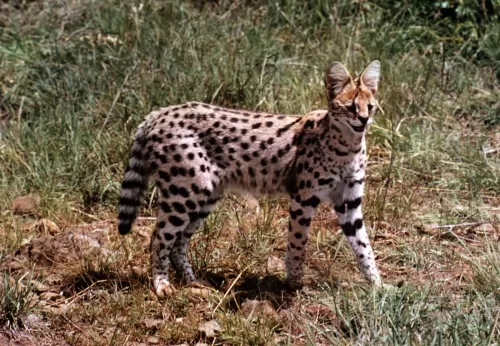 The African Serval is a wild animal and should be left in the wild.
The African Serval is a wild animal and should be left in the wild.
However, if you do decide to bring one into your home as a pet, they aren’t recommended for homes with young children or for a first-time pet owner.
Their play is rough and they like to use their teeth and claws during play. If the child gets hurt, then in typical unfair human fashion, the Serval is the one who suffers. They are capable of making good pets though but it is not recommended.
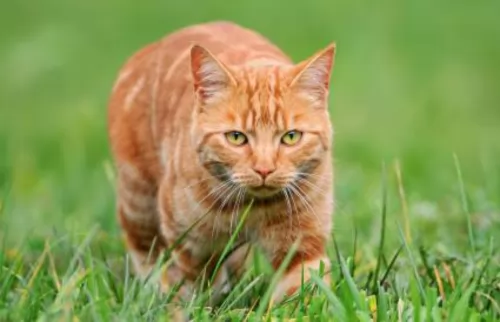 The link between personality and hair color is a talking point among humans, and so it is with cats.
The link between personality and hair color is a talking point among humans, and so it is with cats.
The Ginger Tabby, with its marmalade shade coat is feisty, playful, bold, courageous, and interesting.
Certainly, when you bring this cat into your home, not only are you going to have a beautiful cat but one that is full of character and charm.
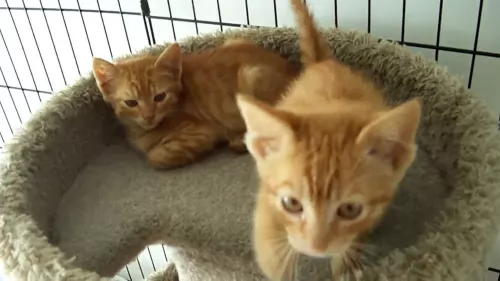 Guard your ginger tabby against eating too much and guard against a diet that is nutritionally inadequate as this contributes to poor health.
Guard your ginger tabby against eating too much and guard against a diet that is nutritionally inadequate as this contributes to poor health.
Cats are carnivores and live on meat but you can speak to your vet about giving your cat the chance of a long life by feeding him proper amounts of a healthy diet.
Make sure he also gets plenty of exercise. Offer him things to climb on, such as an indoor climbing tree so that he can exercise when you’re not there. This is important for helping him stay physically and mentally fit.
All cats are susceptible to bacterial and viral infections. Deadly diseases like this are preventable through vaccination. Vaccines offer protection from other dangerous diseases like feline leukemia virus.
All kinds of parasites – internal and external can invade your cat and make him miserable and sick and a trip to the vet is imperative.
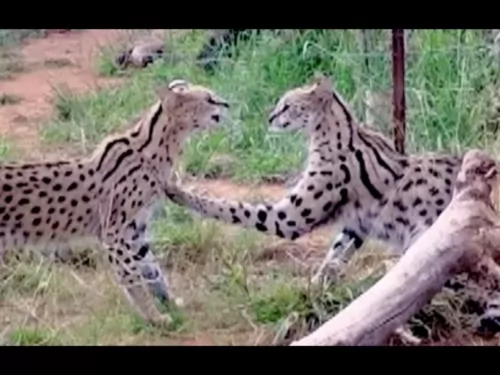 The Serval is a wild cat so in the wilds it eats prey such as frogs, birds and reptiles. They are known for leaping high into the air to catch prey but they will also burrow into holes to get prey out.
The Serval is a wild cat so in the wilds it eats prey such as frogs, birds and reptiles. They are known for leaping high into the air to catch prey but they will also burrow into holes to get prey out.
You should try to provide your Serval pet with some whole prey. Do research on the food of Servals because you will need to offer your wild pet a feline supplement. There are also formulated pelleted food, but this shouldn’t form the bulk of his food but rather be a supplement to his meats. Choose a variety of meats such as chicken, mice, turkey, beef, duck as well as rabbits and birds.
If you keep a serval, it is imperative that it has large outdoor areas to roam in. They’re nocturnal animals, so they become more active at night. They’re used to living near streams in the wild so some kind of pool will be required for him, possibly even a fish pond where he can catch his own fish.
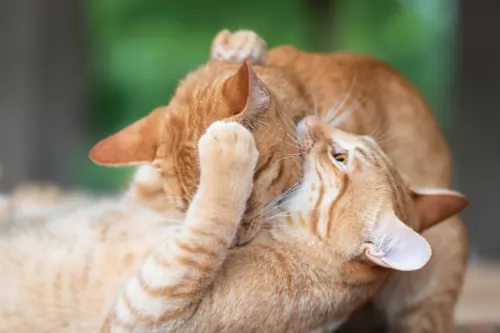 Have your Ginger Tabby cat spayed or neutered. In females, the ovaries and uterus are removed and in males the testicles are surgically removed.
Have your Ginger Tabby cat spayed or neutered. In females, the ovaries and uterus are removed and in males the testicles are surgically removed.
This common op has health benefits and decreases the likelihood of certain types of cancers in your pet. Very importantly it eliminates the possibility of your pet becoming pregnant or the male cat getting out and fathering unwanted litters. The world has too many unwanted kittens and cats as it is.
Brushing your Tabby cat will help with shedding. If you brush your Tabby once a week, you’ll remove all those loose hairs that gives your cat an ungroomed look. Cats shed more in Spring and Autumn and then you may want to increase your brushing to twice a week. Bear in mind that if your cat has shedding which is abnormal it could well be a nutritional thing. Diet is everything. He may not be getting the right mix of ingredients. Speak to your vet as your Tabby may be requiring more of certain vitamins in his diet.
Clip your cat’s nails and make a point of checking inside his mouth for bad teeth and inside his ears for wax and dirt buildup.
Your Ginger Tabby will need food and water bowls, litter box, sleeping place, collar, and toys as well as a carrier box for when he needs to get to the vet.